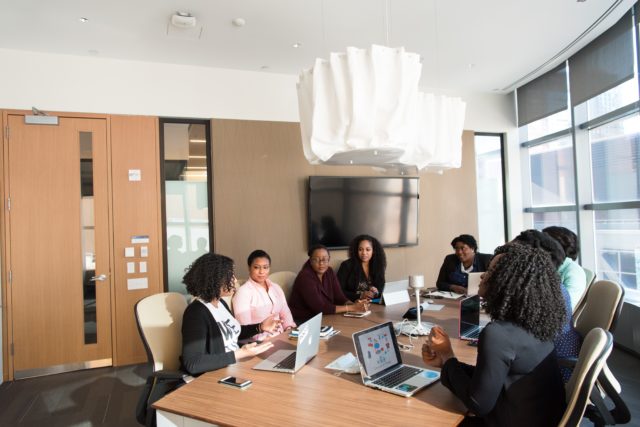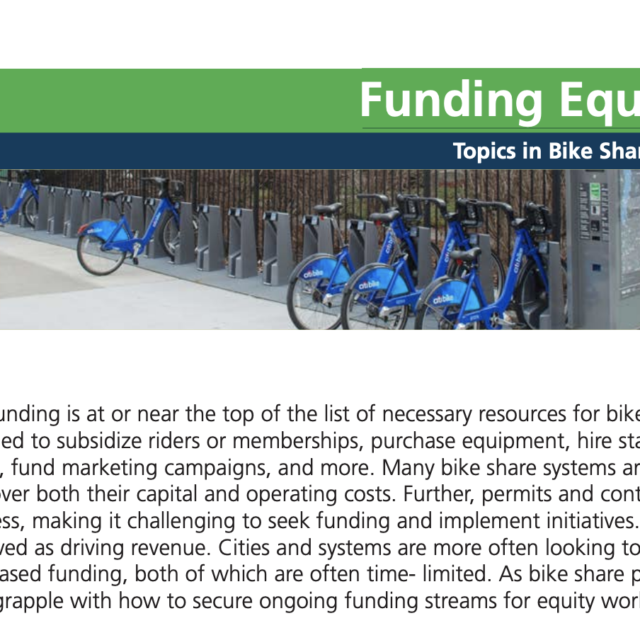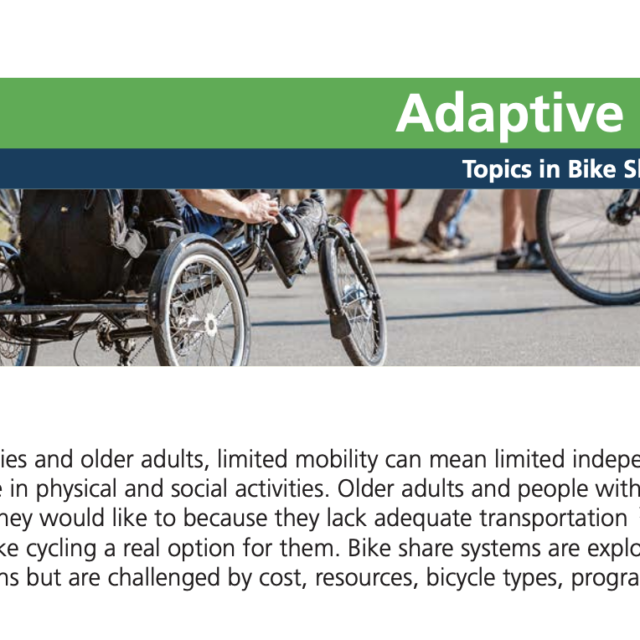New White Paper: We Need to Develop Leadership in Transportation
by Farrah Daniel, Better Bike Share Partnership Writer
September 8, 2020
 Photo by Unsplash
Photo by Unsplash
In partnership with the National Association of Transportation Officials (NACTO), the Better Bike Share Partnership (BBSP) is currently working to amplify the work of Black, Brown and Indigenous professionals of color and allies across the transportation sector.
Through a professional development fellowship, participants will co-strategize, learn new skills, and expand their networks to create and implement their vision for equity and social justice within their organizations.
To help create and design this fellowship, we worked with none other than the esteemed Dr. Destiny Thomas.
Founder and Chief Executive Officer of the Thrivance Group — an entity that provides a framework for project management, urban planning, organizational development and systems change — Dr. Thomas is also a California-based anthropologist planner whose career includes an assortment of roles within transportation and race equity.
The Fellowship Program
Since 2014, BBSP has worked to address barriers to bike share use in communities of color while observing that these same barriers also exist throughout shared micromobility and public transportation.
The Fellows program builds on our efforts to increase the racial and gender diversity of the bike share industry while providing speaking and presentation opportunities to grantees and partners whose voices are underrepresented in that space.
We recognize that removing barriers to access is closely linked to removing barriers to employment and promotion within the shared micromobility field — as we know, representation matters in all places and levels.
In an effort to make affect change, BBSP will develop and execute a year-long rotational fellowship with up to 10 professionals interested in institutionalizing mobility justice in shared micromobility and beyond.
The fellowship is designed to hold space for participants to become co-creators in the outcomes, benefits, and levels of interaction and will support the collective and individual growth of Fellows and the communities they work and live in.
Additionally, the goal is to provide professional development and networking opportunities that will have benefits beyond the time frame of the Fellowship.
Presently, applications are being reviewed, and the next step will be to share applications late this fall. We anticipate to officially commence the Fellowship in January 2021.
Stay tuned for more information!
The White Paper
In this white paper, Dr. Thomas identified the need for this space as well as helped BBSP and NACTO format key components of the final design curriculum. Through various methods of research, she also identified the elements practitioners thought were most important to include.
This white paper is a detailed overview of the insights and research that informed the structure, desired outcomes, and experiences that were included in the BBSP Fellowship for Critical Leadership in Transportation.
Her research included:
- Digital surveys
- Hosting three 90-minute National Strategy Session calls on equity through leadership development to collectively imagine a program that grows, elevates, inspires and heals.
- Creating an archival research report and a needs assessment based on discourse taking place at the time.
- One-on-one calls with transportation sector leaders to assess the aspects of a leadership program their employees would most benefit from.
Before you dive in, here’s what you can expect from the comprehensive Beyond Equity — A Strategy for Developing Critical Leadership in Transportation white paper created by Dr. Destiny Thomas.
The State Of Leadership Development In The Transportation Field
In the first section of her white paper, Dr. Thomas writes, “When existing leaders in the transportation planning field are asked to consider adopting official equity frameworks for personnel practices and project development, the myth of impracticality is a common device for resisting potential disruption to the status quo.”
In this section, Dr. Thomas shares responses and insights from responses from the National Strategy Session calls and highlights the lack of representation within the transportation sector. She also dives into the crisis of equity in transportation, noting that it’s a crisis that penalizes more than the professionals in this field, but also the transit riders living in poverty caused by the planning sector.
A Strategy For Critical Leadership Development
There is an immediate need for policy-based interventions that work to resolve equity gaps, says Dr. Thomas. She provides four examples of policy-based projects:
- Developing a plan for comprehensive free transit
- Creating a tool or process for measuring progress and accountability for equity values
- Developing a process for analyzing investments and policies through a critical lens
- Evaluating what benefits those investments bring to communities that have been harmed by traditional metrics in the past
Additionally, she shares how emerging leaders can work to inform the widespread operationalization of equity values as well as tactical strategies to manage and respond to inequity and microaggressions in the workplace. Plus, she discusses the importance of affinity spaces, mentors, how professional development can center the individual values of participants and more.
(Re)Developing Leaders
Dr. Thomas says professional development in the current state of the transportation planning sector has to serve a dual purpose of:
- Healing and meeting emerging leaders who have been relegated to the margins of the field.
- Preparing emerging leaders to meet themselves outside of the narratives and harms imposed on them by policies and decision-makers not intending to serve their needs or communities.
Here, Dr. Thomas provides an overview of the Fellowship’s desired outcomes and experiences that exhibit critical leadership development.
— — — — — — — — —
Excited for this program? Let us know on Facebook, Twitter and Instagram!
View the white paper here! Then, be sure to check out our upcoming article: A Q&A with Dr. Destiny Thomas.
The Better Bike Share Partnership is a JPB Foundation-funded collaboration between the City of Philadelphia, the Bicycle Coalition of Greater Philadelphia, the National Association of City Transportation Officials (NACTO) and the PeopleForBikes Foundation to build equitable and replicable bike share systems. Follow us on Facebook, Twitter and Instagram or sign up for our weekly newsletter. Story tip? Write farrah@peopleforbikes.org



